That showed how hard he had been taking it, asking me if it had any flaws instead of telling me. As I reported he had been so busy enjoying the feel of the pressure going that he hadn’t concentrated, though he had got the main point.
“None that I can see,” I said. “Of course his killing Kalmus is what settles it. With Kalmus and Blount out, and with your inexpressible relief that we can forget the other three messengers, what else is there? The arsenic got in him somehow. Of course there’s plenty to guess about, for instance what Kalmus said or did that told him that Kalmus had figured it out, but that’s not a flaw, it’s only a gap. The only flaw I see is that there’s no possible way you can ever prove that he killed Jerin. He’s absolutely airtight. On Kalmus there may be a chance. He goes to Kalmus’s apartment, maybe invited and expected, maybe not. Anyhow Kalmus lets him in, no doorman or hallman, and the elevator is do-it-yourself. He catches Kalmus off guard, knocks him out with the ash tray, gets the cord and uses it, and leaves. Fingerprints were no problem; they’re no problem any more for anyone with an ounce of brains. The only chance would be if someone saw him enter or leave, and naturally the cops are working on that, though not with him in mind. In order to get motive you’d have to prove that he killed Jerin and Kalmus knew it or suspected it, and that’s hopeless. As for his motive for killing Jerin, why not your theory, to get Blount because he wanted his wife. He had had more contacts with her person and personality than any of the others. As for taking some arsenic with him when he went to the club that night, that’s easy. He knew what Blount was going to do because Kalmus had asked him what to use to get the effect Blount wanted. He would be the natural one for Kalmus to ask.”
I nodded. “Perfect. Not a flaw except the one little detail that you and Homicide and the FBI all put together will never hang it on him. He was a sap to kill Kalmus because they might possibly tag him for that if they find someone who saw him enter or leave, and no matter how well Kalmus had it mapped, his killing Jerin, he couldn’t possibly have had any evidence to back it up. There just couldn’t be any. He could have told Kalmus to go soak his head.”
Wolfe grunted. “An adequate exposition.”
“I like it.”
“Adequate as far as it goes. But granting that Kalmus had no evidence that would convince the police, even if he revealed the fact that Blount was determined to keep secret, his knowledge or suspicion presented another threat. What if he convinced Blount? Or, more to the point, Mrs. Blount?”
I raised a brow. “Yeah. Sure. That would have been a nuisance, no matter what happened to Blount. But while that may explain why he killed Kalmus, it doesn’t alter the main—”
I stopped. He had leaned back and closed his eyes and started his lips going, out and in, out and in. As I said before, the lip exercise is not to be interrupted, and I crossed my legs and got comfortable for a two-minute wait, maybe three, glancing at my watch.
It was nearer thirty than three. Twenty-one minutes and ten seconds had passed when he opened his eyes and straightened up, setting a record. As always, I had exercised my mind by trying to decide where and what he was headed for, and as usual, I ended up with an assortment of possibilities, worth a dime a dozen. What he did that time was not in my assortment. No wonder he had taken a while to make up his mind; he had decided he had to call a woman on the phone.
“I must speak with Mrs. Blount,” he said. “What’s her number?”
I swiveled and reached for the phone, but he snapped, “No. The number. I’ll dial it. You aren’t here.”
I turned. “Where am I?”
“I don’t know. You have been dismissed, discharged by me for dereliction of duty immediately after you reported to me on your conversation with Mr. Blount. Don’t leave the house. Don’t answer the telephone or doorbell. Tell Fritz that if anyone asks for you, you have gone out — that’s all he knows. I’ll give you instructions after I have spoken with Mrs. Blount. What’s her number?”
I told him, and sat and watched him dial it. As I said, that had not been in my assortment, getting fired just after I had brought him inexpressible relief.
Three hours later, at twenty minutes to ten, I stood in the alcove at the end of the hall next to the kitchen, observing, through the hole in the wall, the cast that had been assembled for what I consider one of the best charades Wolfe has ever staged.
On the office side the hole is covered by a pretty picture of a waterfall on the wall five feet to the right of Wolfe’s desk. On the alcove side it is covered by a metal panel at eye level which slides open without a hint of a noise, and, standing there, you find that the made-to-order waterfall is no obstruction to your view of the office or to your hearing. It wasn’t quite as clear for either my eyes or my ears as if I had been inside seated at my desk, but I couldn’t very well be there since I had been fired in disgrace, and besides, that chair won’t hold two and Saul Panzer was in it.
At twenty minutes to ten Wolfe entered, crossed to his desk, greeted them with three stingy nods — left, center, and right — and sat. All of them except Saul had come at the request of Mrs. Blount, after Wolfe’s phone call to her. She had been put in the red leather chair by Saul, as instructed by me. In the front row of yellow chairs Sally was on the left, Ernst Hausman in the center, and Dr. Avery on the right, next to Saul at my desk. Behind them were Morton Farrow, the nephew, and Charles W. Yerkes, the banker.
Sally was the only one who had any idea what was up. Because she had had to be not only briefed, but rehearsed, thoroughly, she had come at seven-thirty and eaten dinner with me in the kitchen. In the kitchen for two reasons: so Wolfe could stick to his rule of no business at the table, and so Fritz could hear us. One of them might possibly ask Fritz some question when he admitted them, a question that must be answered right, and he had to know what to say. The one thing Sally didn’t know was that I would be watching the performance through the hole. That was no part of it anyway; I was watching only to pass the time and to see and hear Wolfe tell a pack of lies; and Sally would probably have glanced so often at the picture of the waterfall that she might have attracted attention, and Wolfe wanted all the attention.
He was getting it, from seven pairs of eyes. “I don’t thank you for coming,” he told them, “because you came to oblige Mrs. Blount, not me, and because I am not in a mood to feel gratitude for anything whatever. As you all know, three days ago, Monday, I was hired by Miss Blount to act in the interest of her father. Yesterday he himself wrote me a note engaging my services, though I didn’t learn of it until this morning. I am now compelled to make an extremely humiliating admission, and I felt that I should make it to all of you — you who because of your concern have been good enough to come to see me and answer my questions. True, one of you is twice a murderer, one of you killed both Paul Jerin and Daniel Kalmus, but I couldn’t exclude him because I can’t name him. I won’t keep you long. I merely—”
“That’s slander,” Hausman blurted. “That’s libel.” His lips parted to show his teeth. “Unless you can prove it. Can you prove it?”
“No.” I had Wolfe in profile and couldn’t see his eyes. “Nor do I expect to. I am withdrawing from the case. I shall return to Miss Blount the fee she paid me. I have received none from her father.”
I can’t report the reactions of the others because I was focused on Sally. She did fine. She stared, and her mouth dropped open, and then she jumped up and cried, “But you can’t! You can’t! Where’s Archie?” I could report on Mrs. Blount if there were anything to report, since her profile was almost on the line to Sally, but she didn’t move or speak.
Читать дальше

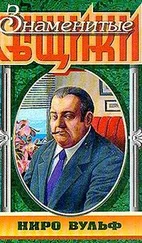
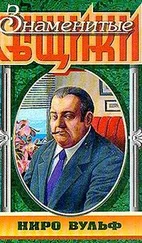

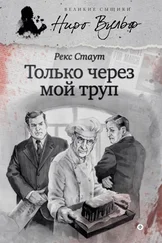

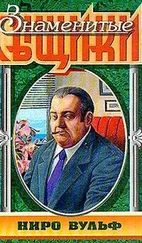
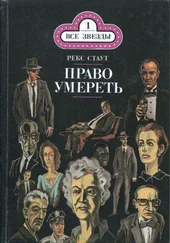
![Рекс Стаут - Лига перепуганных мужчин [litres]](/books/394342/reks-staut-liga-perepugannyh-muzhchin-litres-thumb.webp)